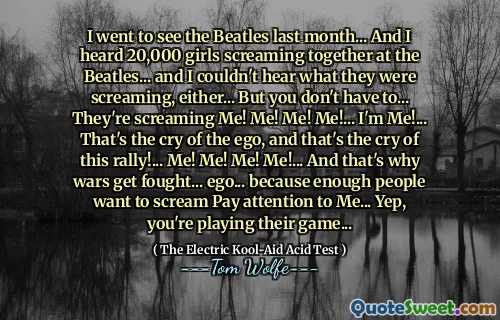None of us are going to deny what other people are doing. If saying bullshit is somebody's thing, then he says bullshit. If somebody is an ass-kicker, then that's what he's going to do on this trip, kick asses. He's going to do it right out front and nobody is going to have anything to get pissed off about. He can just say, 'I'm sorry I kicked you in the ass, but I'm not sorry I'm an ass-kicker. That's what I do, I kick people in the ass.' Everybody is going to be what they are, and whatever they are, there's not going to be anything to apologize about. What we are, we're going to wail with on this whole trip.
In "The Electric Kool-Aid Acid Test," Tom Wolfe reflects on the notion of authenticity and self-expression among individuals in a communal journey. He emphasizes a culture where everyone embraces their true selves without fear of judgment. The idea is that if one person's behavior seems outrageous, such as using provocative language or being aggressive, they should feel free to act that way without needing to apologize. Each person's identity and actions are accepted as part of the collective experience, fostering an atmosphere of mutual respect.
Wolfe suggests this acceptance creates a liberating environment where individuals can fully engage in their roles, whether that means being outspoken, humorous, or assertive. By advocating for personal honesty and freedom of expression, he highlights the journey as a celebration of individuality. Thus, the trip becomes a platform for everyone to "wail" in their unique ways, reinforcing the idea that authenticity is invaluable and should be embraced among diverse personalities.







